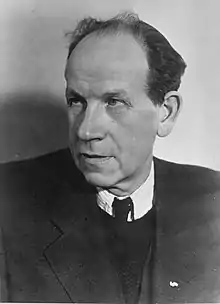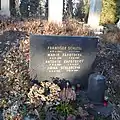Antonín Zápotocký | |
|---|---|
 Antonín Zápotocký in 1948 | |
| President of Czechoslovakia | |
| In office 21 March 1953 – 13 November 1957 | |
| Preceded by | Klement Gottwald |
| Succeeded by | Antonín Novotný |
| Prime Minister of Czechoslovakia | |
| In office 15 June 1948 – 14 March 1953 | |
| Preceded by | Klement Gottwald |
| Succeeded by | Viliam Široký |
| Personal details | |
| Born | 19 December 1884 Zákolany, Bohemia, Cisleithania, Austria-Hungary |
| Died | 13 November 1957 (aged 72) Prague, Czechoslovakia |
| Political party | Communist Party of Czechoslovakia |
| Other political affiliations | Czechoslovak Social Democratic Workers' Party |
| Spouse | Marie Zápotocká |
| Parent | Ladislav Zápotocký |
| Signature |  |
Antonín Zápotocký (Czech pronunciation: [ˈantoɲiːn ˈzaːpototskiː]; 19 December 1884 – 13 November 1957) was a Czech communist politician and statesman who served as the prime minister of Czechoslovakia from 1948 to 1953 and the president of Czechoslovakia from 1953 to 1957.
Biography
He was born in Zákolany, Kingdom of Bohemia, Cisleithania (then in Austria-Hungary, now in the Czech Republic). His father was Ladislav Zápotocký, one of the founders of the Czech Social Democratic Party (ČSSD), together with Josef Boleslav Pecka-Strahovský and Josef Hybeš.
He was a delegate of the Left Wing of the ČSSD to the Second Comintern Congress, held in Petersburg, 19 July – 7 August 1920. Together with Bohumír Šmeral, he co-founded the Communist Party of Czechoslovakia (KSČ) when it broke away from the ČSSD in 1921. He was General Secretary of the KSČ from 1922 to 1925. In 1940, he was sent to Sachsenhausen concentration camp.[1] He was released in 1945.
From 18 June to 18 July 1946 he was Chairman of the Constituent National Assembly.
Zápotocký became Prime Minister on 15 June 1948, replacing Klement Gottwald, who became president. On 14 March 1953, shortly after his return from Joseph Stalin's funeral, Gottwald died. As per the Ninth-of-May Constitution, Zápotocký took over most presidential duties until he was elected president in his own right a week later.
Zápotocký favoured a more humane way of governing, but was outflanked by the Stalinist first secretary, Antonín Novotný.
In May 1953, during the monetary reform, which effectively deprived the farmers and better-paid workers of all their savings, sporadic riots against the communist authorities took place. This occasion gave Novotný a chance to seize the upper hand.[2] At a meeting in Moscow, Zápotocký was told to adhere to "collective leadership"—in effect, give up power to Novotný.
Zápotocký stayed in office until his death in Prague in 1957. He was also second Czechoslovakia president to die in office. His body was cremated at Strašnice Crematorium and interred.
Zápotocký penned several novels, two of which were made into films - Red Glow Over Kladno (Rudá záře nad Kladnem) and New Warriors Will Rise (Vstanou noví bojovníci).
 Grave of Antonín Zápotocký
Grave of Antonín Zápotocký Statue of Antonín Zápotocký in his birthtown Zákolany
Statue of Antonín Zápotocký in his birthtown Zákolany
References
- ↑ Tillack-Graf, Anne-Kathleen (2012). Erinnerungspolitik der DDR. Dargestellt an der Berichterstattung der Tageszeitung "Neues Deutschland" über die Nationalen Mahn- und Gedenkstätten Buchenwald, Ravensbrück und Sachsenhausen (in German). Frankfurt am Main: Peter Lang. pp. 18, 64. ISBN 978-3-631-63678-7.
- ↑ Czechoslovak history at Encyclopedia Britannica
External links
 Media related to Antonín Zápotocký at Wikimedia Commons
Media related to Antonín Zápotocký at Wikimedia Commons- Biography
- H. Gordon Skilling, "The Formation of a Communist Party in Czechoslovakia", American Slavic and East European Review, Vol. 14, No. 3 (Oct., 1955), p. 346-358 doi:10.2307/3000944
- H. Gordon Skilling, "The Comintern and Czechoslovak Communism: 1921-1929", American Slavic and East European Review, Vol. 19, No. 2 (Apr., 1960), p. 234-247 doi:10.2307/3004193
- Newspaper clippings about Antonín Zápotocký in the 20th Century Press Archives of the ZBW
